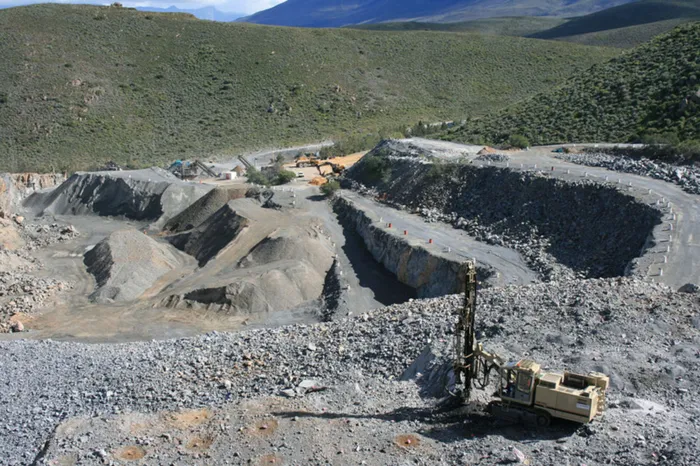Afrimat production volumes recover in Q2 but rail transport remains a problem

The Afrimat stone quarry. Picture: Simphiwe Mbokazi/ Independent Newspapers
Afrimat’s sales volumes increased in the second quarter of its 2025 financial year, but were unlikely to make up for the decline in the first quarter, the bulk commodities, building materials, and industrial minerals, the mid-tier miner said yesterday in a trading update.
The share price fell more than 2% to R65.11 yesterday afternoon after the release of the trading statement. The price is above the R59.60 it traded at a year ago, and nearly double the R33.89 it traded at three years ago.
During the first quarter to end May, the bulk commodity market was lacklustre. Also, volumes were impacted by the underperforming iron ore export corridor, and ArcelorMittal South Africa’s issues, specifically the force majeure at the Vanderbijlpark facilities due to the freeze of two furnaces.
In contrast, in the second quarter to end August, volume increases were evident as domestic customers with furnaces started up again, and tender activity increased in road, rail, and small infrastructure projects.
In Afrimat’s construction materials segment, volumes were maintained in the first quarter. By the second quarter, the integrated Lafarge quarries increased volumes.
There were 34 new appointments in the Lafarge business of which 25 were fixed-term contracts, five were permanent and four learners were taken on. The loss-making cement component in the Lafarge business had been reduced, but remained loss-making.
“At the time of the acquisition, the cement kilns were extremely unreliable, and a highly experienced team is working on the turnaround. Although an improvement is visible, this business component is expected to remain loss-making by the end of the second quarter,” Afrimat’s directors said.
“Innovative strategic initiatives are expected to turn this business unit into a good contributor in future,” the director said.
In the industrial minerals segment, the suspension of load shedding was positive. The volume increase from a low base was supplemented through marketing initiatives into new markets.
In the bulk commodities segment, Afrimat said it was encouraged by Transnet’s new management team’s cooperation. However, the limited availability of locomotives, derailments, and maintenance downtime at Transnet continued to constrain the performance of export iron ore.
“The (half year) volumes are down by 20% when compared to the (2024 half-year) volumes. The international iron ore price, which has remained in a low-trading band remains attractive to Afrimat, which has positioned itself as a low-cost operator,” the group said.
Local iron ore volumes suffered a 70% retraction in the first quarter. This was due to much-reduced volumes taken up by ArcelorMittal. Volumes in the second quarter however were tracking at normal levels.
At the Nkomati anthracite mine, the production rate at the open pits had ramped up. An Eskom powerline was being moved after a “frustratingly long approval time”, to enhance the ease of the open-cast mining. Underground operations remained difficult due to geological limitations.
With the single super phosphate plant commissioned, sales volumes for fertiliser were coming through and ramped up to achieve the planned volumes of 30 000 tons by 2025, which would then contribute positively to the 2026 financial year. The rare-earth component was being researched.
BUSINESS REPORT
Related Topics: